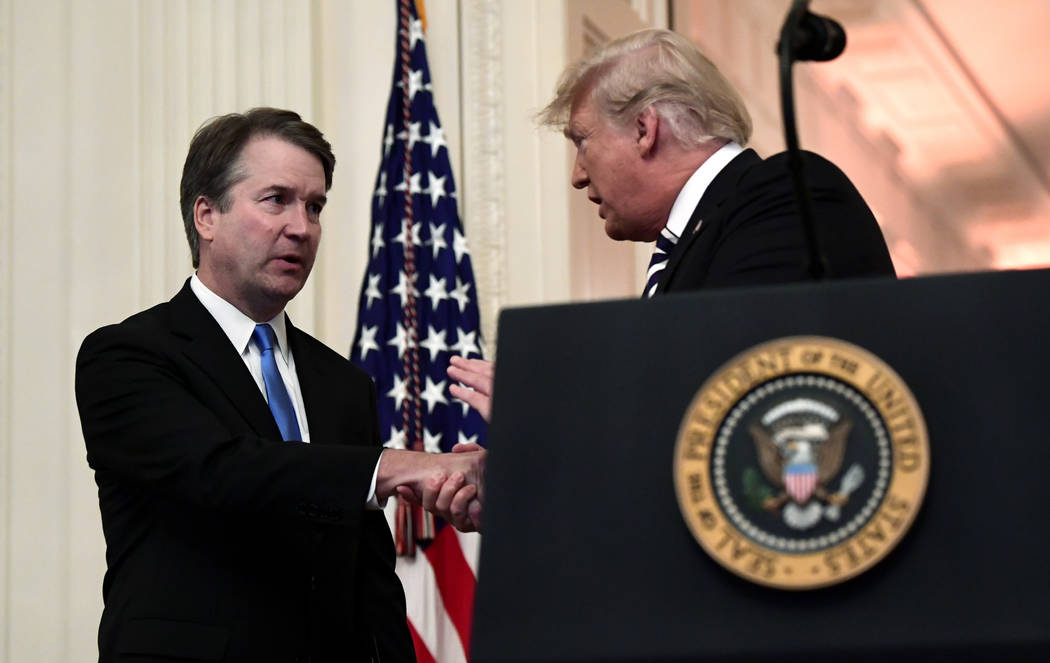Trump apologizes to Kavanaugh during swearing-in ceremony
WASHINGTON — New Supreme Court Justice Brett Kavanaugh returned to the White House on Monday for a ceremonial swearing-in two days after he officially became a member of the high court.
Before the ceremony, President Donald Trump apologized to Kavanaugh and his entire family “for the pain and suffering you have been forced to endure” during a bitter partisan fight over his nomination.
Trump also dismissed a charge by California professor Christine Blasey Ford that Kavanaugh had sexually assaulted her when they both were in high school. “You sir, under historic scrutiny, were proven innocent,” Trump proclaimed.
As he addressed the room, Kavanaugh recognized the confirmation process was “contentious and emotional,” but said, “I take this office with gratitude and no bitterness.”
“It did not change me,” he added.
Kavanaugh, along with his law clerks, already has been at the Supreme Court preparing for his first day on the bench Tuesday, when the justices will hear arguments in two cases about longer prison terms for repeat offenders.
Former Justice Anthony Kennedy swore in Kavanaugh as his wife Ashley and daughters Margaret and Liza stood by him. Trump stood beaming with the Kavanaughs in a ceremony that was over in half an hour.
The East Room was packed with elected officials, attorneys, think tank heads and clergy who supported Kavanaugh. All eight sitting justices sat on the front row.
Senate Leader Mitch McConnell, R-Ky., who helped push Kavanaugh’s confirmation through the Senate, got a standing ovation when he entered the room.
Kavanaugh was confirmed by the Senate on Saturday by a narrow 50-48 vote. The vote capped a fight that seized the national conversation after claims emerged that Kavanaugh had sexually assaulted women three decades ago. Kavanaugh emphatically denied the allegations.
Moderates lead the way
His confirmation was a victory Trump won in part because of the support of McConnell and three longtime Republican senators whom the president and his base often deride as RINOs (Republicans in name only) — Susan Collins of Maine, Jeff Flake of Arizona and Lindsey Graham of South Carolina.
“I think moderates saw the opportunity to nonpolarize and bring us back to reality and common sense and decency and fairness,” said Fox News analyst Brad Blakeman, who knew Kavanaugh when both served as lawyers for President George W. Bush. “When Democrats went too far, it was Republican moderates who brought everybody to reality.”
During the 2016 campaign, liberals loved Graham as he sparred regularly with Trump. Graham called Trump the “world’s biggest jackass,” and Trump publicly released Graham’s cellphone number “for fun.”
But on Sept. 27, after Ford testified that Kavanaugh had sexually assaulted her more than 30 years before, it was Graham who galvanized demoralized Republicans when he delivered a jeremiad in favor of the “presumption of innocence.”
Any love from the left is gone. Democratic pollster Paul Maslin told the Review-Journal that Graham and the other GOP moderates had “joined the list of culpable Republicans that gave us this monster.”
Only 14 months ago, Trump and McConnell were barely speaking to each other. The president ripped McConnell on Twitter for not getting a measure to repeal and replace Obamacare through the Senate. McConnell thought Trump did not understand how Washington works.
As the Senate prepared for a confirmation vote on Sept. 28, however, McConnell brokered a deal with three swing-vote Republicans, Collins, Flake and Sen. Lisa Murkowski of Alaska.
That morning, Flake had announced he would vote for Kavanaugh, but after two women berated him in a Capitol elevator, the senator made it known he wanted the FBI to investigate the allegations against Kavanaugh.
That led to a deal to give the FBI one week to look into Ford’s charge and an accusation by a Yale graduate who said Kavanaugh exposed himself at a dormitory party three decades ago.
A year ago, Flake had announced he would not run for re-election in 2018 because he could “no longer be complicit or silent” in the face of Trump’s “reckless, outrageous and undignified” behavior.
Trump responded by dubbing the Arizona senator “Flake(y)” on Twitter.
This time, rather than disparage Flake, Trump told reporters that the last-minute call for a probe “could be a blessing in disguise.”
On Monday, Trump recognized McConnell “as a leader who has never wavered,” and gave a shoutout to all Republicans on the Senate Judiciary Committee, including Graham and Flake.
Collins in the spotlight
In 2016, Collins announced that she would not vote for Trump. She wrote in The Washington Post that she believed he was unsuitable for office because he “lacks the temperament, self-discipline and judgment required to be president.”
Then, in July 2017, Collins was one of three Republicans to vote against a “skinny” bill to repeal President Barack Obama’s Affordable Care Act, earning Trump’s enmity.
On Friday, Collins announced her full-throated support for Kavanaugh and delivered an impassioned 45-minute speech on the Senate floor. She called Ford’s testimony “sincere, painful and compelling,” then gently laid out the ways her accusation could have been corroborated but wasn’t.
Trump commended Collins on Monday “for her brave and eloquent speech and her declaration” that when passions are most inflamed, fairness is most in jeopardy.
Blakeman called Collins’ speech “probably one of the finest speeches ever given in that body.” He also said that many base Republicans told him the moderates “saved the day.”
Now, Maslin said, Collins is a “dead woman walking” who will be a target of Democrats in the 2020 election.
“We’ll organize Maine as you’ve never seen before,” he said.
Contact Debra J. Saunders at dsaunders@reviewjournal.com or 202-662-7391. Follow @DebraJSaunders on Twitter.

























